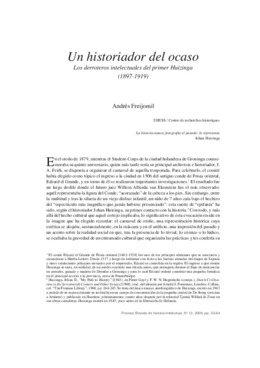| dc.creator | Freijomil, Andrés G. | |
| dc.date.accessioned | 2020-02-03T17:06:12Z | |
| dc.date.available | 2020-02-03T17:06:12Z | |
| dc.date.issued | 2009 | |
| dc.identifier.citation | Freijomil, A. G. (2009). Un historiador del ocaso : los derroteros intelectuales del primer Huizinga (1897-1919). Prismas, 13(13), 33-64. | es |
| dc.identifier.issn | 1666-1508 (impresa) | es |
| dc.identifier.issn | 1852-0499 (en línea) | es |
| dc.identifier.uri | http://ridaa.unq.edu.ar/handle/20.500.11807/1810 | |
| dc.description | Fil: Freijomil, Andrés G. École des Hautes Études en Sciences Sociales. Centre de Recherches Historiques; Francia. | es |
| dc.description.abstract | Lejos del sosegado y espléndido cuadro de su obra más clásica, El otoño de la Edad Media, los primeros derroteros intelectuales del historiador holandés Johan Huizinga [1872-1945] están cargados de fuertes conflictos epistemológicos en torno de la historia y la literatura que aún permanecen en la sombra. Este primer período representa un tiempo clave para comprender no sólo los orígenes de aquella gran obra, sino también la naturaleza de una serie de investigaciones menos difundidas que hacen de Huizinga uno de los principales representantes de la “historia de la cultura” tal como era entendida durante la primera mitad del siglo XX . Para ello, este artículo recupera por primera vez en español el relieve de algunas de esas obras así como parte de la correspondencia que ha mantenido con otros grandes historiadores de aquel período como Henri Pirenne y Lucien Febvre. Cuestiones como la literatura oriental, la filología alemana, los problemas estéticos y filosóficos del conocimiento histórico, el enclave de una historiografía holandesa aún en lento desarrollo, o su lucha contra el cientificismo, son variables de un período de intensas investigaciones y debates intelectuales en los que la participación de Huizinga ha sido clave. | es |
| dc.description.abstract | Far from the appeased and splendid picture of his classic work, The Autumn of the Middle Ages, the early intellectual routes of the Dutch historian Johan Huizinga [1872-1945] are loaded with strong epistemological conflicts surrounding the history and literature that still remain in the shade. This first period represents a key to understanding not only the origins of that great work, but also the nature of a series of investigations that make of Huizinga one of the leading representatives of the “cultural history” as it was understood during the first half of the twentieth century. We have recuperated for the first time in Spanish some of these works and a part of his correspondence with other major historians of the period as Henri Pirenne ou Lucien Febvre. Issues such as the oriental literature, German philology, philosophical and aesthetic problems of historical knowledge, the site of a Dutch historiography still in slow development, or anti-scientism, are variables in a period of intense research and intellectual debate where Huizinga’s participation has been key. | es |
| dc.format | application/pdf | es |
| dc.language | spa | es |
| dc.publisher | Universidad Nacional de Quilmes | es |
| dc.rights | https://creativecommons.org/licenses/by-nc-nd/2.5/ar/ | es |
| dc.source | Prismas | es |
| dc.subject | Huizinga, Johan, 1872-1945 | es |
| dc.subject | Biografías | es |
| dc.subject | Historia | es |
| dc.subject | Literatura (Arte) | es |
| dc.subject | Historiografía | es |
| dc.subject | Países Bajos | es |
| dc.subject | Biographies | es |
| dc.subject | History | es |
| dc.subject | Literature (Art) | es |
| dc.subject | Historiography | es |
| dc.subject | Netherlands | es |
| dc.subject | Biografias | es |
| dc.subject | História | es |
| dc.subject | Historiografia | es |
| dc.subject | Países Baixos | es |
| dc.title | Un historiador del ocaso : los derroteros intelectuales del primer Huizinga (1897-1919) | es |
| dc.type | info:ar-repo/semantics/artículo | es |
| unq.blm.ubicacion | P-AR-PRI1 | es |
| unq.articulos.paginicio | 33 | es |
| unq.articulos.pagfinal | 64 | es |
| unq.revista.numero | 13 | es |
| unq.revista.volumen | 13 | es |
| unq.version | info:eu-repo/semantics/publishedVersion | es |
| unq.articulos.seccion | Artículos | es |
| unq.tipo.snrd | info:eu-repo/semantics/article | es |
| unq.acceso | info:eu-repo/semantics/openAccess | es |

